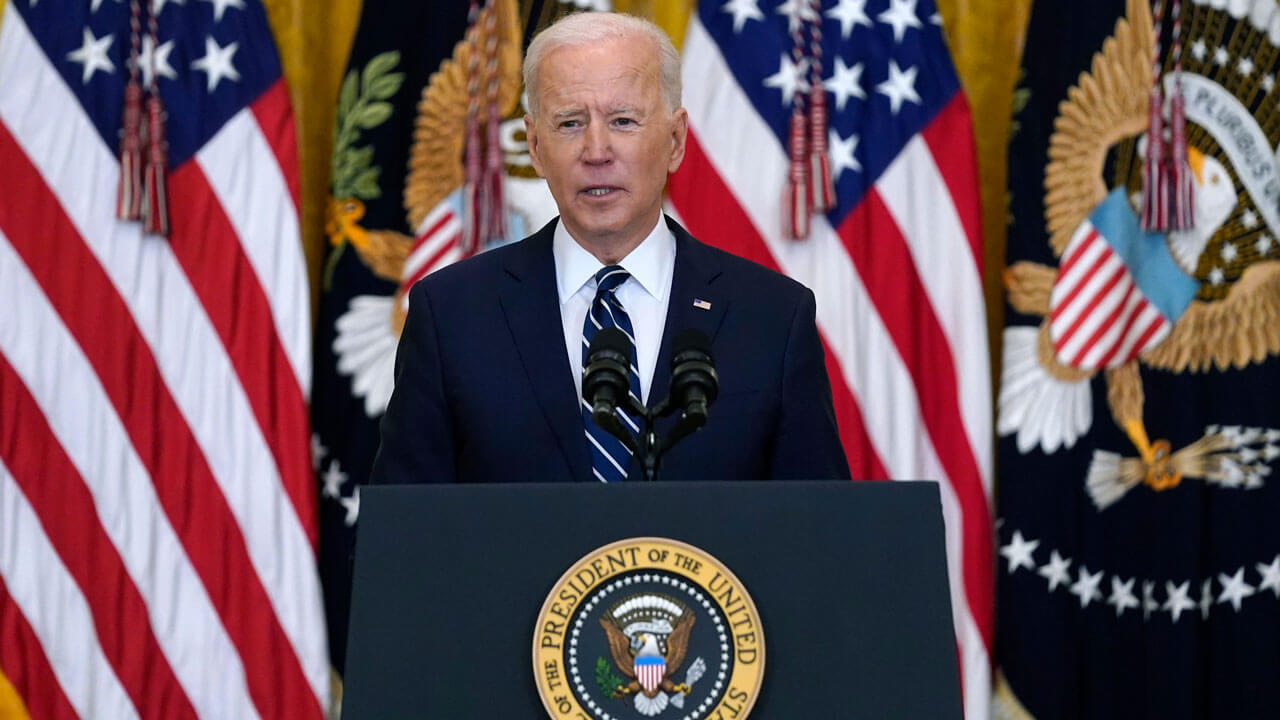US President Joe Biden held his first formal press conference at the White House on Thursday, his 64th day in office. Over the course of an hour, the leader fielded a range of questions from reporters, relating to the coronavirus crisis, gun reform, immigration, and re-election. Here are some key takeaways from Biden’s remarks:
On the government’s response to the COVID-19 pandemic:
Biden opened his remarks by announcing that he had doubled the administration’s vaccination goal from 100 million to 200 million shots during the first 100 days of his term. “I know it’s ambitious, twice our original goal, but no other country in the world has even come close — not even close — to what we are doing. And I believe we can do it,” the president said.
With the passage of the American Rescue Plan, the president emphasized that the government was now moving swiftly to bring some sense of peace and stability to ordinary Americans affected by the pandemic through $1400 stimulus payments—100 million of which have already been delivered—as well as increased efforts to expand access to vaccines for the hardest-hit and highest-risk communities in the country. Biden said that his $1.9 trillion relief package was already reaping benefits, with analysts now project a 6% growth in GDP this year.
Though tackling COVID-19 is at the top of the administration’s agenda, Biden said that he intended to address all challenges—including long-term issues like voting rights, gun control, climate change, and immigration reform—as soon as he is able to. However, he reiterated that the government was presently focused on alleviating the immediate suffering on the American people brought on by the current public health crisis.
On the situation at the southern border:
When quizzed about how he intended to handle the large number of people seeking to enter the country illegally through its southern border, the president said that his administration was working to address the root causes of migration, while also rebuilding a system that can accommodate present realities. “It’s going to take time,” Biden noted. However, he stressed that this did not mean that the borders were open and said that the government was turning people away, while also engaging with countries like Mexico to see if they could accommodate them. Biden further said that the only people who were not being turned away, for now, were children (unaccompanied minors) and stated that his administration was working tirelessly to house them in decent facilities, and to reunite them with their families.
The president also dismissed the notion that the number of immigrants was on the rise because of their perception of him as a “nice guy”. He also defended the rolling back of Trump-era immigration policies, arguing that they were inhumane, and didn’t help the situation at all. “The reason they’re [immigrants] coming is that it’s the time they can travel with the least likelihood of dying on the way because of the heat in the desert, number one,” Biden said. “Number two, they’re coming because of the circumstances in-country—in-country.” He reiterated that the only way to deal with this challenge was to address the root causes of why people are leaving in the first place.
On Republican’s efforts to curb voting rights, and the filibuster
Biden condemned Republican officials’ efforts to limit voting rights as “sick” and “un-American” and said that his administration would do everything in its power to prevent states from taking such actions that undermined democracy.
When asked about the Senate rule that requires 60 votes to approve legislation—which has made it harder to implement his agenda—the president said that he was open to change, saying that the filibuster was being “abused in a gigantic way.” However, he stopped short of committing to it. Biden nevertheless said that he supported the idea of requiring senators to keep talking in order to block legislation and said that such a move could dissuade lawmakers from routinely using the present rule.
On Afghanistan
Speaking about the upcoming deadline of May 1 for troop withdrawal from Afghanistan, Biden said that the timeline would be difficult to commit to, for tactical reasons. “So, we’ve been meeting with our allies, those other nations that have NATO Allies who have troops in Afghanistan as well. And if we leave, we’re going to do so in a safe and orderly way,” he added. The president said that his senior officials were also engaging with the Afghan government to find ways forward to end the war. However, he said that he had no intention of staying in Afghanistan for a long time, noting that he could not picture US troops in the country next year.
On North Korea
When asked to respond to North Korea testing two ballistic missiles on Thursday, Biden said that Pyongyang’s actions violated numerous United Nations Security Council resolutions (UNSCR). “There will be responses if they choose to escalate,’’ he said. “We will respond accordingly.” However, the president added that he was also prepared “for some form of diplomacy,” but said that it would be contingent upon the end result of denuclearisation.
On Re-election
Biden dismissed any rumours about him not seeking a second term and said that he anticipated running again in 2024. However, he said that he had never been able to plan four years ahead for certain and that he would respect fate when the time came.

